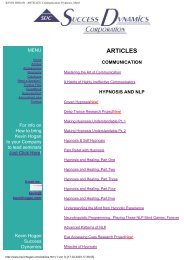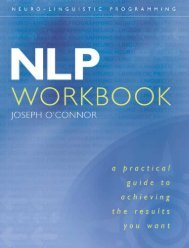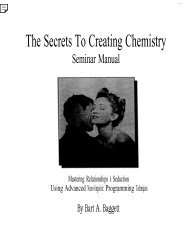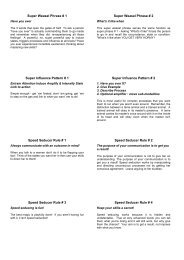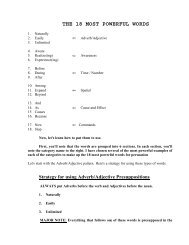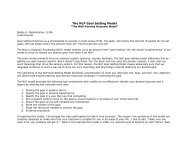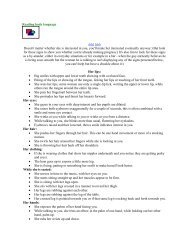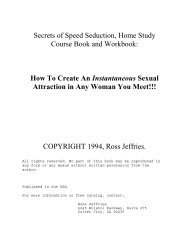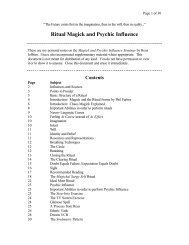A Pragmatic Guide To Communication & Change.pdf - NLP Info Centre
A Pragmatic Guide To Communication & Change.pdf - NLP Info Centre
A Pragmatic Guide To Communication & Change.pdf - NLP Info Centre
- No tags were found...
You also want an ePaper? Increase the reach of your titles
YUMPU automatically turns print PDFs into web optimized ePapers that Google loves.
Use: When the speaker indicates the belief that there are oo exceptions.<br />
Example: When speaker says, "Everyone thinks I'm stupid," ask, "Can you tell me<br />
one person who doesn't? You mean everyone thinks you're stupid, even your pet<br />
rock?"<br />
Example: When speaker says, "I'm always late," ask, "Can you think of. time when<br />
you weren't late?"<br />
Changing Meanings<br />
5. flow do you know?<br />
Use: When the speaker is mind reading. Example: When speaker says, "I know he<br />
doesn't love me," ask, "How do you know?" Example: When speaker says, "He<br />
should know better," ask, "flow should he know?"<br />
important to bring into their conscious awareness the specific behaviors which<br />
they believe to be the cause of the emotional states. 13y maintaining a meta<br />
perspective - an awareness of the pattern involved - you can effectively lead the<br />
speakers to an understanding of the concept in ways that are more relevant to<br />
them personally. In this way you would not deal directly with the more abstract<br />
ideology that underlies their belief system but would concentrate on more<br />
pragmatic, practical implications of the pattern.<br />
One mistaken notion sometimes arises during the teaching of the concept of cause and<br />
effect to groups. Some people think it implies that a person may do whatever he likes<br />
regardless of others. I would like to stress that a person who is behaving in a responsible<br />
manner is cognizant enough of others to take into account how they may choose to<br />
respond to his behaviors. Most individuals do not care to spend time with someone who<br />
behaves in a way which is unpleasant to them. People learn early what kinds of behavior<br />
will get them what they want, and these are incorporated into their models of the world.<br />
Everyone is always acting in accordance with these models.<br />
Only too often, these generalized statements about the world come from the speaker's<br />
own model. By linguistically leaving himself out as the evaluator or judge, the speaker<br />
indicates the possibility that there are limits within his model that he doesn't recognize as<br />
being self-imposed. 13y requesting the speaker to identify the "judge" who is making<br />
these value judgements, you can assist him in confronting those limits or rules in his<br />
model of the world. Once they have been identified, they can be challenged for their<br />
validity, especially if they are preventing the speaker from experiencing a fuller, richer<br />
life.<br />
Some examples of this violation that are often indicative of unconscious, limiting rules<br />
are:<br />
109<br />
Lost performative. Lost performative refers to judgments, beliefs, or standards expressed<br />
by a person in such a way that the individual who is making the judgment or setting the<br />
standard is not identified in the speaker's SS. 'these statements usually come out as<br />
generalizations about the world, and they have no apparent connection with the speaker.<br />
In the illustration below, it is hard to tell whether the girl is simply "parroting" something<br />
she has heard or actually believes what she is saying. Of course, the hm's response to her<br />
initial statement indicates what he thinks about the matter!<br />
Speaker: "That's a stupid thing to do." Response: "That's stupid according to



